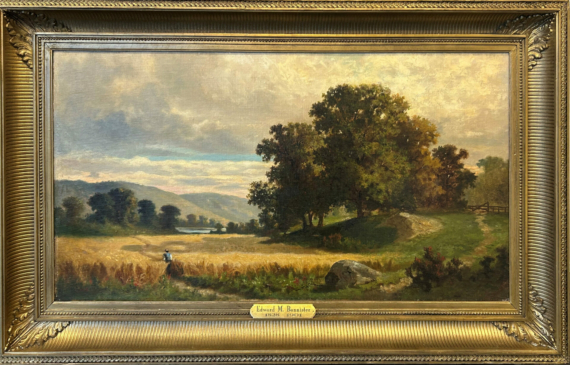

SOLD
Edward M. Bannister (American, 1828-1901)
Walking Through a Field, c. 1870s-1880s
Oil on canvas, 22 H. x 42 W. inches
Initialed “EMB” lower right; signed “E M Bannister” on verso
Edward Mitchell Bannister was one of the few African American painters of the nineteenth century to win significant recognition. He grew up on the coast in New Brunswick, and spent several months working as a ship’s cook. He lost both his parents when he was young and moved to Boston, where he took sculpture classes and learned photography.
Bannister faced an uphill battle to become a professional artist. In 1867 the New York Herald stated that “the Negro seems to have an appreciation of art” but went on to assert that blacks were “manifestly unable to produce it” (Driskell, Two Centuries of Black American Art, 1976). Bannister decided to prove the article wrong and in 1876 achieved his goal when one of his paintings won a medal at the Philadelphia Centennial Exposition. When he arrived to claim his prize, however, he was refused entry because he was black. Bannister was a founder and member of the Providence Art Club and was an original board member of the Rhode Island School of Design.
Although Bannister explored various subjects in his paintings—portraits, myths, genre scenes—his main interest was landscapes and seascapes. He had a knack for capturing the somber moods and serenity of nature. His paintings feel profound, serene, and tranquil. His delicate color and loose brushwork, which got looser as he took influence from impressionist painters, captured his delight with the New England countryside.